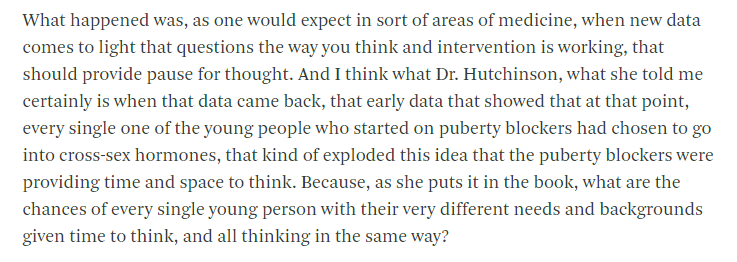Anti-Trans Propaganda Comes to NPR
Did a venerable news radio program get rolled by Jamie Reed?
by Evan Urquhart
NPR is among the most trusted names in American journalism, and for good reason. The network of radio stations is home to serious investigative reporting on topics from fraud in the Paycheck Protection Program to sex abuse in cheerleading and everything in between. This position of trust is why it is so concerning to see On Point, one of NPR’s big syndicated news shows, featuring interviews with activists pushing a misleading narrative about gender affirming care in both the US and the UK.
Assigned has extensively covered the allegations of Jamie Reed, a former case manager with the Washington University Pediatric Transgender Center at St. Louis Children’s Hospital whose allegations seemed fishy from the start because Reed made major errors in her description of the main risks and side effects involved in gender affirming care. The fishy odor continued to worsen as two local news outlets published investigative stories drawing on parents and a former collegue, all of whom directly contradicted the claims Reed made about how quickly the Transgender Center moved to start patients on interventions such as puberty blockers or cross sex hormones. At this point, it seems inescapable that either a large number of parents coordinated with one another to lie to reporters, or that Reed has intentionally misrepresented what went on at the clinic where she once worked.
On Point’s Meghna Chakrabati interviewed Reed as part of a show earlier today focused primarily on issues at the Gender Identity Development Service, part of the Tavistock clinic in the UK. GIDS is where every young person with gender dysphoria in England* receives care. Reed’s segment, which was relatively brief, did not feature any questions about the contrasting reports from patients and parents who were treated at the clinic where she once worked. Chakrabati did mention that there had been local reporting on Reed’s allegations, but rather than highlighting the fact that the reporting provides serious reasons to doubt Reed’s story, it instead described local reporters as having “spoken with families who report positive experiences at the center.”
This treatment of Reed as a reliable source allowed the former case manager to continue o misrepresent her work at the Transgender Center to Chakrabati, making it sound as if she had knowledge of private doctor patient conversations that her role seems unlikely to have allowed.
Reed’s work in intake and scheduling does not seem likely to have had her in the room with any doctors and patients. Although NPR seems to have been familiar with the reporting by the Saint Louis Post-Dispatch, as they linked to it on its show page, Chakrabati does not display any awareness that the Post-Dispatch had raised questions specifically concerning whether Reed would have had knowledge of these meetings, drawing on the accounts of multiple parents as well as on a job listing associated with Reed’s role.
screenshot from the St. Louis Post-Dispatch
The interview with Reed constituted a relatively brief portion of the show, but Assigned has identified found major questions around the part that dealt with GIDS as well. These sections relied on the work of Hannah Barnes, a reporter from the UK of dubious credibility. Barnes has been a critic of GIDS for many years, in a media environment that has long shut out transgender reporters and promoted cisgender reporters like Barnes who engage in anti-trans crusades. Perhaps the most blatant example of Barnes crusading came in 2019, when she published a story titled “Questions remain over puberty-blockers as review clears study.” As the title implies, it dealt with a review that had cleared researchers of any wrongdoing after an ongoing campaign against their study of puberty blockers by, well, Hannah Barnes.
In the article, Barnes and her co-author reference ongoing concerns about puberty blockers, including “a number of concerns were raised to BBC Newsnight and the British Medical Journal:” The article helpfully provides a link to these concerns which were raised to the British Medical Journal in the form of an article written by Barnes and her co-author themselves.
Even readers unfamiliar with journalistic ethics can likely see how misleading it is for a journalist to reference “concerns” having brought to a medical journal without mentioning that she herself was the very source of the concerns. It is, transparently, the act of someone with an ax to grind. Barnes has more recently expanded her campaign against gender affirming care to book length. This book, and Barnes herself, is what NPR seems to have relied on in its coverage of gender affirming care in the UK.
This was a dubious choice, as Barnes seems to have deliberately omitted a key finding of the Cass Review during the interview with Chakrabati. This report was the official review in the UK which found issues with GIDS leading to a decision to shut the clinic down (at the moment it remains open pending alternatives being stood up). Barnes correctly explains the portion of the Cass report dealing with expanding caseloads, differing views among clinicians as to best practices, and the portion calling the evidence for gender affirming care weak. However, there was also a fourth major finding of the Cass report: That excessive wait times drastically impacted the quality of care patients received.
The wait for a first appointment at GIDS for a gender dysphoric young person lasts several years. Currently, GIDS’ website reports it is seeing patients who were initially referred in 2019. Therefore, at a minimum, every single patient seen by GIDS today would have to have persisted in their gender identity for 3 years, and received no treatment for their gender dysphoria in all that time. The website even obliquely suggests social transition as an option for parents trying to help their children cope with long wait times, listing “trying out different ways of expressing their gender, or for some changing a name by deed poll” as suggestions of things that might help.
Wait times at GIDS are inconvenient to the narrative being pushed by Barnes in two ways. First, there’s the obvious: Barnes heavily implies that the patients at GIDS were adolescent girls who only recently came upon the idea that they might be trans boys. Since we know every single child being seen must have necessarily persisted in their identity for at least 3 years by the time of their first appointment, it is impossible that any of them began experiencing gender dysphoria recently, or for their gender dysphoria to have been a transient phase, or at least not a phase lasting less than 3 years.
Wait times are inconvenient to the story in a second way as well. Barnes claims that the young people being seen at GIDS were experiencing severe mental health issues in addition to gender dysphoria. However, because it is widely understood that untreated gender dysphoria causes mental health issues, including self harm and suicidal thoughts, an alternative explanation for why so many of the young people at GIDS had these issues could be that they have all been going untreated, even just with talk therapy, for several years. It is simply impossible to separate issues at GIDS with issues caused by long wait times, or to describe its patients as not having all persisted in their gender for a period of years.
The persistence common to all GIDS patients may also have some bearing on why Barnes reports that none of the youth who were treated with puberty blockers at GIDS decided not to continue with cross sex hormones. The GIDS system so thoroughly selected for persistence that it became extremely unlikely that a child who was not 100 percent firm in their gender identity would ever be seen there. (This also suggests that many children who would have benefitted from an appointment at GIDS never got one, either giving up, aging out, or even dying by their own hand.)
Here’s Barnes on children moving from puberty blockers to cross sex hormones:
Instead of drawing the obvious conclusion—that what the children all had in common was that they’d waited years just for a first appointment—Barnes suggests that the youth weren’t being encouraged to explore their identities enough. There is no evidence that encouraging children to explore their identities more leads to improved outcomes, on puberty blockers or not, but Barnes is only asked about critiques of the current methods, not whether there’s any evidence to suggest the ones she prefers yield better results.
Barnes, of course, knows about the long wait times at GIDS. It would be impossible for her not to. But the reporters at NPR may not have had any idea.
Whatever the reason, On Point featured an interview with an activist who has been engaged in a campaign against gender affirming care for years. Posing as an objective journalist, sh carefully omitted key aspects of the Cass Report that would tend to lead listeners away from the conclusion she wanted them to draw. That the episode also gave Jamie Reed an opportunity to imply that she had been in the room with doctors and patients, when that has been brought into question contradicted by reporting Chakrabati herself mentioned on air, raises real questions about whether those involved in producing the episode knew that the picture they were presenting to their audience was misleading, or whether they were simply taken in by well-practiced campaigners who successfully concealed their agendas from NPR reporters who were too inexperienced with the topic to have known the right questions to ask.
* a previous version of the story stated that every young person with gender dysphoria in the UK recieves care at GIDS. There is a second treatment center in Scotland, which is part of the UK.







